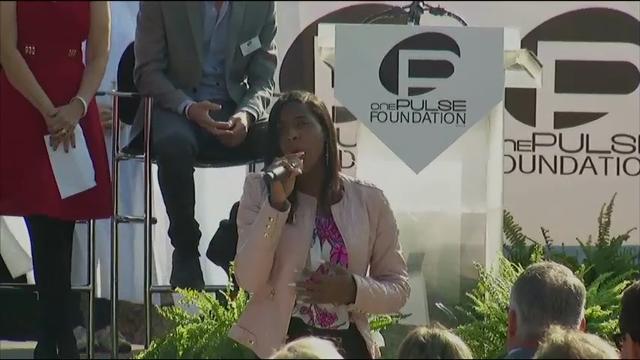Two years after the Orlando shooting, young activists hold a die-in on the Capitol lawn

WASHINGTON — Before the backdrop of the U.S. Capitol, dozens of gun control activists called for action during a die-in protest — one of several rallies Tuesday across the nation to mark two years since the mass shooting at the Pulse gay nightclub in Florida.
Mostly student protesters gave speeches about how gun violence has affected their lives, including stories of being held at gunpoint. They also told of being stuck in schools during an attack and how they lost family members.
Speakers read aloud the names of the 49 people killed in the 2016 attack in Orlando, then laid roses on the grassy lawn overlooking the Washington Monument for each life lost. They dropped to the ground for twelve minutes, roughly one second for every mass shooting since the attack in Orlando.
Amanda Fugleberg, an organizer of the event, remembers watching her television from her Orlando home, about 15 minutes from Pulse nightclub, as the details came in and the death toll continued to rise.
“It was numbing,” she said. “It was unbelievable to even fathom that something so horrendous could take place in my city.”
Since the shooting, deadly gun attacks have struck churches, schools, and concerts every few months. Only 16 months after Pulse, Orlando gave up its grim title of deadliest mass shooting to Las Vegas, where 58 died in a sniping attack along the city's infamous strip.
But in the months since the Valentine's Day shooting at Marjory Stoneman Douglas High School in Parkland, Fla., which killed 17 people, teenagers have become the epicenter of the gun-rights movement. Tuesday's event was just the latest in a burst of youth-driven activism that also involved a massive March for Our Lives event in Washington, D.C. and a series of national school walkouts.
More: Tony Awards: Marjory Stoneman Douglas students give surprise 'Seasons of Love' performance
Several survivors of the Parkland shooting participated in the die-in, and nearly every speech touched on the power of young people.
"I can't vote yet but I can still make my voice heard," said Ingrid Pendergast, 12, who traveled to the die-in from Bloomington, Ind. Her activism was sparked by frequent active shooter drills held by her school and frustration that she has to worry about gun violence while trying to learn.
As tourists walked past the Capitol building Tuesday, students laid down in the grass. They laid in silence, many with signs draped across them covering them from the beating sun, carrying slogans like "Protect Children, Not Guns" and "Stop Killing Us."
A handful of counter-protesters, bearing American flags and signs supporting the Second Amendment, ringed the group of protesters.
"We're just here to show the other side, to be the adults in the room," said Paul Brockman, who held a sign commemorating the victims of the Pulse nightclub shooting, which he said may have gone differently had a legal gun owner been present. "They'll learn."
President Trump echoed a similar notion in February when he suggested the Pulse shooting wouldn't have happened, or wouldn't have been nearly as bad, if someone else had a gun in the club.
"You take Pulse nightclub," he said, according to Politifact. "If you had one person in that room that could carry a gun and knew how to use it, it wouldn’t have happened, or certainly to the extent that it did."
The National Rifle Association — and the politicians who take its donations — was a popular target during the speeches, which urged the crowd to funnel their energy into political involvement and voting in the midterm elections.
Some of the speakers have years before they can vote themselves.
Havana Chapman-Edwards, 7, used a plastic crate to reach the microphone at the podium. Wearing an orange NASA spacesuit to represent her dream of becoming an astronaut, and to remind others that no dream is out of reach, the first grader talked about her cousin who was killed in a shooting and countless others whose lives have been taken by gun violence.
“Just because I’m only 7 doesn’t mean I can’t help change the laws,” she said. “There are adults who keep saying that kids don’t know what we’re about but we know we are never too little to make a difference.”